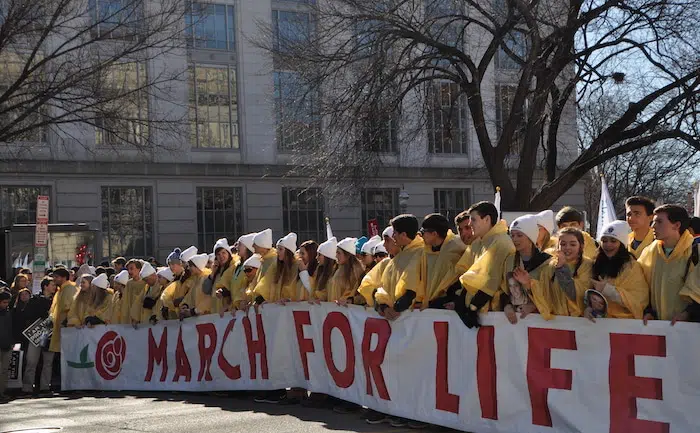Suffering Helps Build a Culture of Life

Today we remember the 47th anniversary of Roe v. Wade—the Supreme Court case that decriminalized abortion in the United States. It’s a somber day, yet when we see the thousands upon thousands of people marching in the March for Life Friday, we have reason to hope.

Photo: March for Life. HLI Piroch
We have hope for the enlightenment of darkened hearts. We have hope for a new generation. We have hope for the effectiveness of the pro-life movement and for all the hard work each and every one of us has done over the past several decades. And we have hope for babies not yet conceived—that they may not suffer at the hands of an abortionist.
I’ve had a lot of time to think about suffering over the past week and a half. I broke two bones in my leg and underwent surgery to insert a rod and screws. Recovery has been painful, but one of the things that has gotten me through is the fact that, as Catholics, when we suffer, we are taught to offer that suffering up—for a poor soul in Purgatory or for someone on earth who is in need. Knowing that the pain I suffered, and continue to suffer, may help someone else by alleviating her pain gives me joy. It’s a beautiful thing to understand that God helps me turn something negative into a positive.
In addition, we offer up our pain to unite ourselves with Christ on the cross. He suffered so much for us. We didn’t deserve His suffering, yet He freely gave His life anyway. Each time we suffer and reflect upon how Christ suffered, we understand Him just a little more. We become closer to Him. We grow in faith and in love.
This broken leg has also caused me to reflect on the immense blessings I have—my friends, coworkers, family—all who have rallied behind me and who have been so integral in my healing. Remember, we all suffer in one way or another. Some suffer silently. Some a little more openly. Some suffer from physical problems, while others suffer from psychological problems. The inclination might be to look at the world around us and compare our sufferings—to say “his is worse than mine” or “mine is worse than hers” and so on. But we need not do that. Suffering is truly an individual thing—and it’s a part of life. God does not want us to compare ourselves to others. He wants us to rely on Him and to get through our suffering with His help. It’s not the events in our lives that define us, but how we react to them. It’s what we do with our suffering that shows the kind of Christians we are. To truly unite ourselves with Christ, we need to have the attitude that good will come of the suffering.
We need to have that same attitude and hope day in and day out about the pro-life movement—that eventually the suffering experienced by families, by the babies themselves, and by us as a nation will end when abortion ends. That is why we must never become complacent. We must never stop fighting to protect the babies, moms, and families. We must learn from the suffering we see day in and day out and resolve to see that that suffering is no more. We must continually build and nurture a culture of life. When we get lost in our own lives, and forget about others, that’s when the culture of death swoops in and takes hold.

March for Life, HLI Piroch
So as you contemplate Roe v. Wade and as you watch people march on Friday, do not despair too much. Understand that though there has been much suffering, God has a plan, and you have an integral part in it. Unite yours with God for the sanctity of human life and all your intentions. Resolve to do one thing every day to help build a culture of life in your home or in your community. Pray. The Lord taught us, “Do not fear nor be dismayed, for the Lord, your God, is with you wherever you go.” Post that meme on Facebook about the sanctity of life. Wear that pro-life T-shirt. Donate to organizations that help save babies. Talk to your kids about the fact that all of God’s children—born and preborn—are valued and wanted. The possibilities are endless.
When you do these things, your joy and your love of the babies will shine through, and others will see it. And as you work to build that culture of life, you will see the suffering around you greatly alleviated, as others learn from your example and begin to build that culture of life with you. That joy will take hold, and the suffering will eventually end.
As Christ said in the Gospel of John, “I have told you this so that you might have peace in me. In the world you will have trouble, but take courage, I have conquered the world.”

